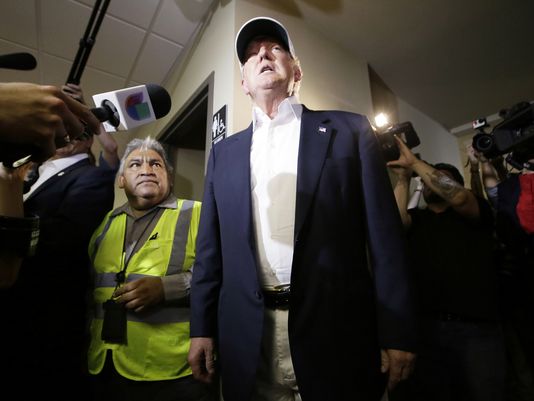
Donald Trump spent Thursday touring the U.S.-Mexico border, the area that has fueled his rise in Republican politics and spawned criticism of him by opponents and Hispanic groups.
"There is a huge problem with the illegals coming through," Trump said during his visit, repeating his pledge to build a wall on parts of the too-leaky border.
"In certain sections, you have to have a wall," Trump said.
Under attack for accusing Mexico of sending "criminals" and "rapists" across the U.S. border, Trump said he supports legal immigration, and claimed that most Hispanics agree with him. The New York businessman, wearing a white hat with the slogan "Make America Great Again," said he employs "thousands" of Hispanics, and his relationships with them are very good.
A group of protesters greeted Trump when his plane landed Thursday in Laredo, a city with a population that is nearly 96% Latino. One critic, referring to the businessman's recent criticism of Sen. John McCain, R-Ariz., carried a sign that said "McCain is a hero, Trump is a chump."
Another sign said: "Trump's hair is illegal."
Asked about the protesters, Trump said he didn't notice them, but did mention demonstrators who "were chanting for me."
Many of Trump's Republican opponents said he is providing false information about migrants, and that his harsh tone is turning off moderate voters of all stripes.
Former Texas governor Rick Perry said he's glad the businessman is "finally" traveling to the border, and "I hope he will explain to the Hispanic Americans he meets why he thinks they are rapists and murderers."
During a brief news conference, someone told Trump that "killers come from all over the globe." Trump replied, "I agree with that."
Rep. Joaquin Castro, D-Tex., criticized local elected officials in the Laredo for accommodating the visitor. "Donald Trump just used you and the other council members to make him look good," he said in a tweet. "Embarrassing for South Texas and Hispanics."
The Republican candidate, who's leading recent national polls, met with local law enforcement officials, with one notable exception: A union of border patrol agents says its members would not accompany him, because, they said, the event had become too politicized.
"Just to be clear, an endorsement was never discussed for any presidential candidate," said a statement from Hector Garza, president of Local 2455 of the National Border Patrol Council. "Local 2455 does not endorse candidates for any political office."
Trump said border agents extended the invitation in order to show the "the tremendous problems" and ":the tremendous crime" they have to deal with. He accused the agents' superiors in Washington, D.C., of silencing them just ahead of the visit, and said that agents "want to be able to do their jobs."
In his statement, Garza said "our intentions to meet with Mr. Trump was to provide a 'Boots on the Ground' perspective to not only Mr. Trump, but to the media that would be in attendance at this event." Now, he said, "it has been decided by Local 2455 to pull out of all events involving Donald Trump."
Garza also said, "make no mistake, our border with Mexico is not secure and there's no doubt that we need to have an honest discussion about that with the American people. Local 2455 will continue to represent our members to the best of our abilities and will make sure that our members concerns are heard by the American people."
Trump has made illegal immigration the centerpiece of his insurgent campaign, but also has drawn criticism from immigration groups who say the businessman is anti-Hispanic.
After his tour, Trump also pledged to drive tougher trade deals with Mexico, China, and other global competitors. "I'll bring those jobs back, and the Hispanics are going to get those jobs," Trump said.
Trump also thanked local officials for touring with him.
"We were treated so nicely," Trump said. "We learned so much."
Trump, who traveled to border areas in a long motorcade with heavy security, including roadblocks that backed up local traffic, said he felt compelled to make the trip despite safety concerns. A USA TODAY investigation in 2011 found that U.S. border cities were statistically safer on average than other cities in their states.


